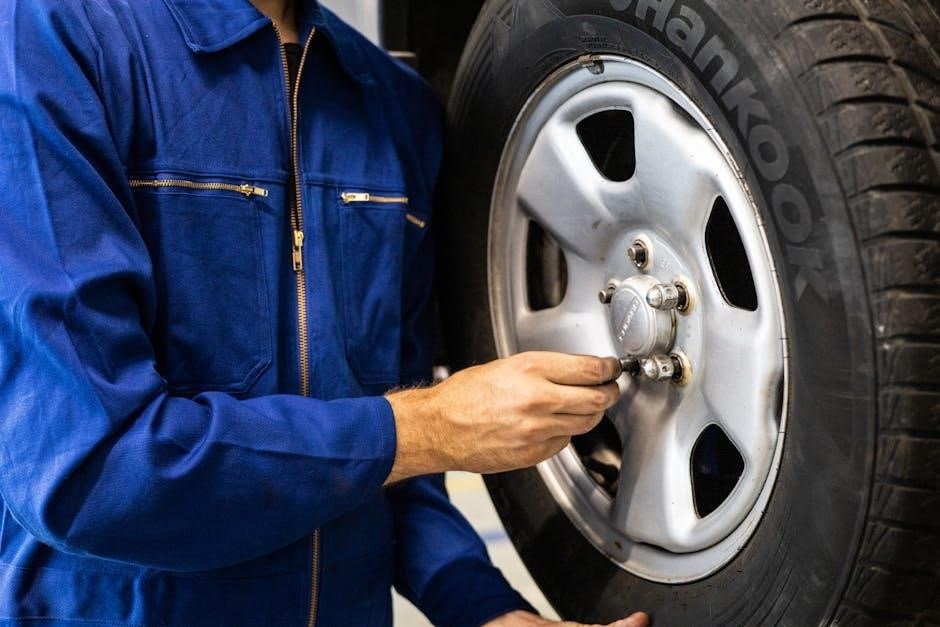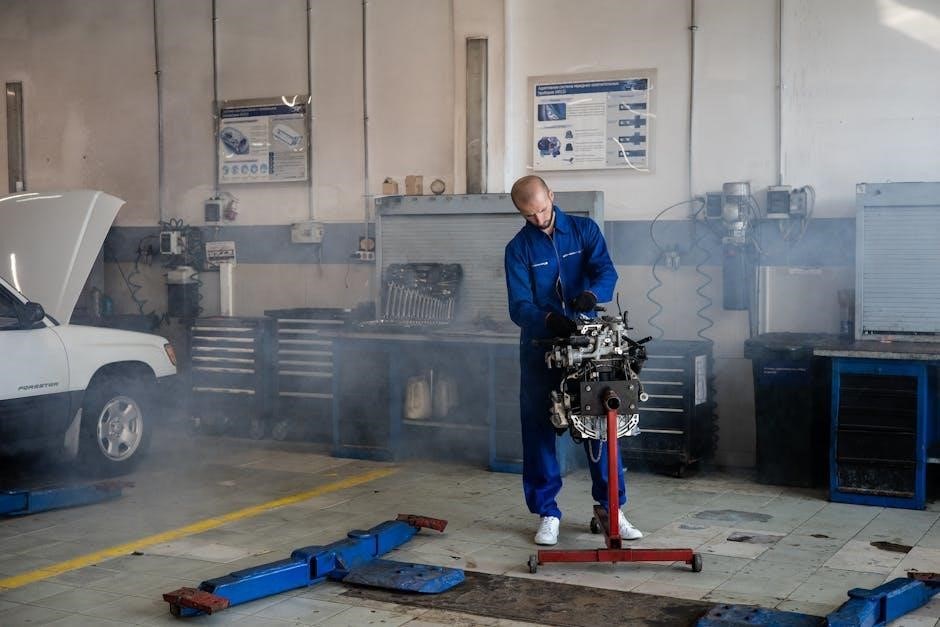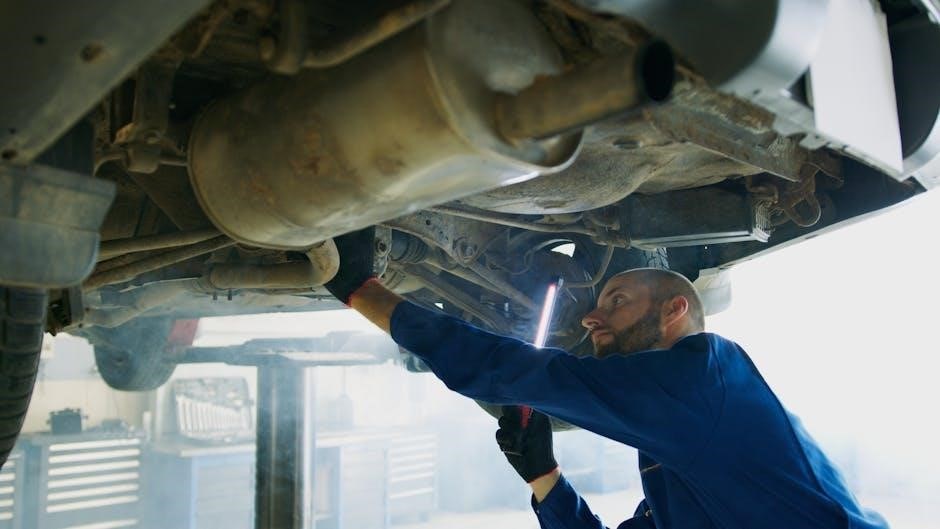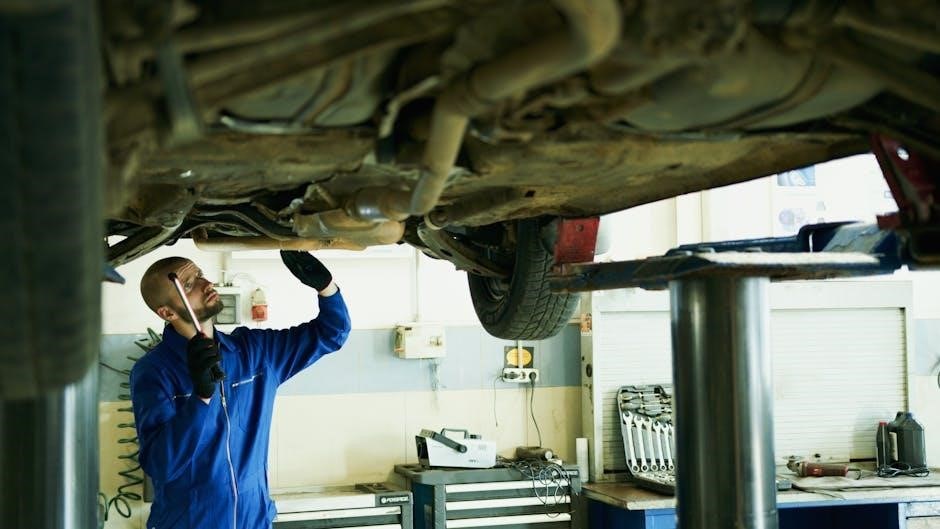The Nissan Service Maintenance Guide is essential for owners to keep their vehicles in optimal condition․ It outlines regular inspections, necessary repairs, and model-specific maintenance schedules․ Following these recommendations ensures peak performance, safety, and longevity of your Nissan․

Importance of Regular Maintenance
Regular maintenance is crucial for extending the lifespan of your Nissan and ensuring optimal performance․ It helps prevent mechanical failures, reduces repair costs, and enhances safety on the road․ By following the recommended schedule, you can identify and address potential issues early, avoiding costly breakdowns․ Proper upkeep also maintains your vehicle’s warranty and resale value․ Additionally, regular servicing improves fuel efficiency and overall driving experience․ Key services like oil changes, tire rotations, and inspections ensure all components function as intended․ Neglecting maintenance can lead to premature wear and tear, compromising both safety and reliability․ Stay proactive with routine checks to keep your Nissan running smoothly for years to come․
Overview of Nissan’s Maintenance Schedule
Nissan’s maintenance schedule is designed to ensure your vehicle operates efficiently and safely․ It typically recommends services at intervals of 5,000 to 60,000 miles, tailored to different driving conditions․ The schedule includes essential tasks such as oil and filter changes, tire rotations, and inspections of critical systems like brakes and batteries․ Additionally, air filter replacements and belt inspections are scheduled at specific mileages to maintain performance․ Nissan also provides model-specific guidelines, ensuring each vehicle receives the care it needs․ By adhering to this schedule, owners can prevent major repairs, maintain warranty coverage, and enjoy a smooth driving experience․ Regular maintenance is a proactive approach to preserving your Nissan’s longevity and reliability, ensuring it performs at its best for years to come․

Nissan Maintenance Schedule by Mileage
Nissan’s maintenance schedule is structured by mileage to ensure timely care․ Services are recommended at intervals of 5,000, 10,000, 15,000, 30,000, and 60,000 miles to maintain optimal vehicle health and performance․
Every 5,000 Miles or 6 Months
Regular maintenance at 5,000 miles or 6 months is crucial for your Nissan’s health․ This interval typically includes an oil and filter change, ensuring your engine runs smoothly․ Additionally, tire rotation is recommended to maintain even tread wear and improve safety․ Mechanics will also inspect the brake system for wear and function, and check the battery health to prevent unexpected failures․ Air filters may also be inspected and replaced if necessary to optimize performance and fuel efficiency․ Following this schedule helps prevent major repairs and keeps your vehicle under warranty․ Consistency in these early checks ensures your Nissan performs at its best for years to come․ Always refer to your specific model’s guide for precise recommendations tailored to your vehicle․
Every 10,000 Miles or 12 Months
At 10,000 miles or 12 months, your Nissan requires a more comprehensive check․ This service typically includes an oil and filter change to maintain engine health․ Additionally, fluid levels (coolant, transmission, and brake) are inspected and topped off as needed․ Mechanics will also examine the serpentine belt for cracks or wear and check the wiper blades for proper function․ Tire rotation is performed to ensure even tread wear, and the exhaust system is inspected for leaks or damage․ This interval is crucial for identifying potential issues early, preventing costly repairs, and ensuring your vehicle runs efficiently․ Regularly following this schedule helps maintain your Nissan’s performance and extends its lifespan․ Always consult your owner’s manual or a certified technician for model-specific recommendations․
Every 15,000 Miles or 18 Months
At 15,000 miles or 18 months, your Nissan requires more detailed attention to ensure longevity․ This service typically includes air filter replacement to improve fuel efficiency and performance․ Tire rotation is performed to maintain even tread wear, and a thorough brake system inspection is conducted to check pads, rotors, and fluid levels․ Additionally, the battery health check ensures reliable starting power․ It’s also a good time to inspect belts and hoses for signs of wear․ This interval is crucial for maintaining your vehicle’s health and preventing potential issues down the road․ Always refer to your Nissan’s specific maintenance guide or consult a certified technician for precise recommendations tailored to your model․ Regular adherence to this schedule helps preserve your car’s performance and extends its lifespan․
Every 30,000 Miles or 36 Months
At 30,000 miles or 36 months, your Nissan requires a more comprehensive service to maintain its performance and reliability․ This interval typically includes replacement of engine oil and filters, as well as a detailed inspection of critical components․ The timing chain should be inspected for wear, and the drive belts (such as the serpentine belt) are checked for cracks or fraying․ Additionally, the hoses and coolant are evaluated to ensure proper engine temperature regulation․ Brake pads and rotors may need attention if they show signs of excessive wear․ It’s also a good time to inspect the exhaust system for leaks or damage and to check the suspension for alignment and stability․ Following these recommendations helps prevent costly repairs and ensures your Nissan continues to run smoothly․ Always consult your vehicle’s specific maintenance guide or a certified technician for precise service requirements․
Every 60,000 Miles or 60 Months

At 60,000 miles or 60 months, Nissan recommends a major service to ensure long-term reliability and performance․ This interval includes replacement of the timing chain, water pump, and spark plugs, which are critical for engine longevity․ The drive belts (such as the serpentine belt) should be replaced if they show signs of wear or cracking․ Additionally, the hoses and coolant are checked and replaced if necessary to prevent overheating issues․ The exhaust system is inspected for leaks or damage, and the brake system is evaluated for wear on pads and rotors․ It’s also a good time to inspect and replace the air filter and check the battery health․ Furthermore, the suspension and steering systems are aligned and inspected for proper function․ Adhering to this schedule helps prevent breakdowns and ensures your Nissan remains in excellent condition for years to come․

Key Maintenance Services

Regular oil and filter changes, tire rotations, and brake inspections are essential․ Additionally, battery health checks and air filter replacements ensure optimal performance and longevity for your Nissan vehicle․
Oil and Filter Changes
Regular oil and filter changes are crucial for maintaining your Nissan’s engine health․ Nissan recommends changing the engine oil every 5,000 to 7,500 miles, depending on driving conditions․ Synthetic oil is often suggested for better performance and longevity․ During each oil change, the filter should also be replaced to ensure clean oil circulation․ Neglecting this can lead to engine wear and reduced fuel efficiency․ Always use oil that meets Nissan’s specifications to avoid damage․ Proper disposal of used oil and filters is also important for environmental safety․ Adhering to this schedule helps maintain your vehicle’s warranty and ensures optimal performance over time․ Refer to your Nissan Service Maintenance Guide for exact intervals tailored to your model and driving habits․ Consistent oil changes are a simple yet vital step in preserving your vehicle’s health and longevity․
Tire Rotation and Inspection
Tire rotation and inspection are essential maintenance tasks for your Nissan․ Regular rotation ensures even tread wear, improving handling and extending tire life․ Nissan recommends rotating tires every 5,000 to 7,500 miles, depending on your driving habits and model․ During inspections, check for signs of damage, uneven wear, and proper inflation․ Underinflated tires can reduce fuel efficiency and increase wear․ Properly inflated tires improve safety and performance․ Always refer to your vehicle’s owner’s manual for specific rotation patterns and intervals․ Neglecting tire maintenance can lead to premature wear and increased risk of tire failure․ Keep your tires in great condition to ensure a smooth and safe driving experience․ Regular checks and rotations are simple steps to maintain your Nissan’s performance and reliability․ Stay proactive with tire care to avoid costly repairs down the road․
Brake System Inspection

Regular inspection of your Nissan’s brake system is crucial for safety and performance․ The brakes are one of the most critical components of your vehicle, ensuring reliable stopping power․ Nissan recommends inspecting the brake system every 10,000 to 15,000 miles or as outlined in your maintenance guide․ During inspections, technicians check the brake pads, rotors, calipers, and brake fluid levels․ Worn brake pads or warped rotors can lead to reduced braking efficiency and increased stopping distances․ Additionally, brake fluid should be tested for contamination and replaced as needed to maintain proper hydraulic function․ Signs of wear, such as squealing noises or a spongy brake pedal, should be addressed promptly․ Neglecting brake maintenance can lead to costly repairs and potential safety hazards․ Regular inspections ensure your brakes remain in optimal condition, providing peace of mind and reliable performance on the road․
Battery Health Check
A battery health check is a vital part of maintaining your Nissan’s reliability and performance․ The battery powers essential systems, including the engine and electrical components․ Over time, batteries degrade, and cold weather can exacerbate this process․ Nissan recommends regular inspections to ensure your battery remains in good condition․ During a health check, technicians will test the battery’s voltage, check for corrosion on terminals, and ensure proper connections․ If the battery is weak or old, it may need replacement to prevent unexpected breakdowns․ Signs of a failing battery include slow engine crank, dim headlights, or difficulty starting the vehicle․ Regular checks can help identify issues early, ensuring your Nissan starts reliably and runs smoothly․ A healthy battery is essential for consistent performance and avoiding costly repairs down the road․
Air Filter Replacement
Regular air filter replacement is crucial for maintaining your Nissan’s performance and fuel efficiency․ The air filter ensures clean air enters the engine, promoting proper combustion and reducing emissions․ Over time, the filter becomes clogged with dust, pollen, and debris, which can decrease engine efficiency and fuel economy․ Nissan recommends replacing the air filter every 15,000 to 30,000 miles, depending on driving conditions․ If you frequently drive in dusty or polluted areas, more frequent replacements may be necessary․ A dirty air filter can cause poor engine performance, reduced horsepower, and increased fuel consumption․ During replacement, the cabin air filter should also be inspected to maintain clean airflow inside the vehicle․ Proper maintenance of air filters ensures your Nissan runs smoothly, efficiently, and remains environmentally friendly․ Always consult your Nissan Service Maintenance Guide for specific recommendations tailored to your vehicle’s needs․

Model-Specific Maintenance Guides
Model-specific guides provide tailored maintenance schedules for Nissan Altima, Sentra, Rogue, and others, ensuring optimal performance and longevity through recommended service intervals and genuine parts․
Nissan Altima Maintenance Schedule
The Nissan Altima maintenance schedule ensures your vehicle runs smoothly and efficiently․ Recommended services include oil and filter changes every 5,000 to 7,500 miles, tire rotations every 5,000 miles, and brake inspections at 10,000 miles․ The timing chain should be replaced at 300,000 miles․ Regular checks for fluid levels, belts, and air filters are also advised․ For model years 2014 and later, the first service is free after 5,000 miles, with subsequent services at 10,000 and 15,000 miles․ Following the guidelines helps maintain your warranty and ensures optimal performance․ Always consult your owner’s manual or a certified Nissan technician for personalized recommendations․ Proper maintenance enhances fuel efficiency, reduces repair costs, and extends the lifespan of your Altima․
Nissan Sentra Maintenance Schedule
The Nissan Sentra maintenance schedule is designed to keep your vehicle running reliably․ Recommended services include oil and filter changes every 5,000 to 7,500 miles, tire rotations every 5,000 miles, and brake inspections at 10,000 miles․ Battery health checks and air filter replacements are also suggested at regular intervals․ For model years 2014 and later, the first service is free after 5,000 miles, with subsequent services at 10,000 and 15,000 miles․ Following the guidelines helps maintain your warranty and ensures optimal performance․ Always consult your owner’s manual or a certified Nissan technician for personalized recommendations․ Proper maintenance enhances fuel efficiency, reduces repair costs, and extends the lifespan of your Sentra․

Nissan Rogue Maintenance Schedule
The Nissan Rogue maintenance schedule ensures your SUV remains in top condition․ Regular oil changes are recommended every 5,000 to 7,500 miles, with tire rotations every 5,000 miles to ensure even wear․ Brake inspections should occur at 10,000 miles, while the air filter should be replaced every 15,000 miles․ Battery health checks are advised annually or every 12,000 miles․ For model years 2014 and later, the first two services at 5,000 and 10,000 miles are complimentary․ Following this schedule helps maintain your warranty and prevents costly repairs․ Additionally, the Rogue’s maintenance cost is relatively low, with estimated expenses around 15,690 for five years․ Proper upkeep ensures your Rogue delivers consistent performance, efficiency, and reliability for years to come․ Always refer to your owner’s manual or consult a certified Nissan technician for specific recommendations tailored to your vehicle․

Additional Tips for Vehicle Longevity
Regular checks, proper driving habits, and using genuine parts can significantly extend your vehicle’s lifespan․ Addressing minor issues promptly and maintaining a consistent service routine ensures optimal performance and reliability over time․
Diagnosis of Common Issues
Diagnosing common issues early is crucial for maintaining your Nissan’s health․ Regular inspections can reveal potential problems before they escalate․ Dashboard warning lights, unusual noises, or decreased performance are signs to investigate․ Use tools like the Nissan Service Assistant or consult the electronic logbook for insights․ Common issues include worn brake pads, low battery health, or clogged air filters․ Check for signs of fluid leaks, cracked belts, or uneven tire wear․ Addressing these promptly prevents costly repairs․ Always refer to your Nissan Service and Maintenance Guide for guidance․ Using genuine Nissan parts ensures compatibility and reliability․ Regular checks at authorized service centers can help identify issues early, ensuring your vehicle runs smoothly and maintains its warranty․ Stay proactive with routine diagnostics to keep your Nissan in optimal condition․
Importance of Genuine Parts
Using genuine Nissan parts ensures your vehicle performs optimally and maintains its warranty․ These parts are designed specifically for your Nissan model, guaranteeing perfect fitment and reliability․ They are rigorously tested to meet Nissan’s high standards, ensuring safety and durability․ Counterfeit or third-party parts may seem cost-effective but can lead to premature wear, reduced performance, and even safety hazards․ Genuine parts are engineered to withstand the stress of driving conditions and maintain your vehicle’s integrity․ They also come with a warranty, offering peace of mind․ Always choose authorized Nissan dealers for replacement parts to ensure quality and authenticity․ Prioritizing genuine parts supports your vehicle’s longevity and preserves its value․ Make the smart choice for your Nissan’s maintenance needs with genuine components designed to deliver unparalleled performance and reliability․ This ensures your car runs as intended by its manufacturers, safeguarding both safety and efficiency on the road․
